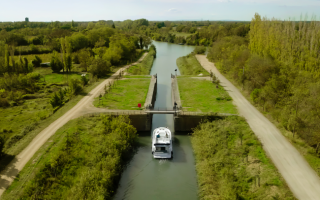Birdsong still trills
As a nationwide tour begins, playwright RACHEL WAGSTAFF tells Caroline Bishop about adapting a celebrated World War I novel for the stage
Two decades since it propelled Sebastian Faulks to literary fame, Birdsong, his novel about love, loss and World War I, has become so universally cherished that it is no longer his alone. ‘I feel that it has passed into a sort of common ownership,’ Faulks writes in the introduction to a recent edition of his 1993 book, which has sold three million copies, is a fixture on school reading lists and became a BBC TV drama in 2012. He adds: ‘I could wish no better fate for this or any other book than to find a life in the minds of others.’That is exactly what happened to Rachel Wagstaff, a young playwright who could visualise her favourite book so clearly that she decided to adapt it into a stage play. From the house in Amiens in Picardy, where married Frenchwoman Isabelle Azaire and visiting English businessman Stephen Wraysford conduct a passionate affair in 1910, to the rat-infested tunnels and trenches of the Somme where Stephen later serves in World War I, Wagstaff “could just picture it all really clearly… they felt like moments that could be captured very well on stage.”Writing an adaptation that would get the approval of its fans was never going to be easy, but Wagstaff felt her own passion for the book qualified her to try. “If you know how much that book means to you, then you also appreciate how much it means to everyone else,” she says. “I felt that if – and I knew it was a big if – I could get a version that Sebastian was really happy with, I was probably some way to pleasing the people who loved the book.”
Full of compassion
When she approached Faulks in 2006 Wagstaff was a little-known 26-year-old playwright with limited experience. Asking the living writer you most admire for permission to tinker with his most famous novel takes guts. “It was partly naivety and partly passion,” says Wagstaff. “I thought the worst thing he could say was ‘no’. I took heart from the fact that his books were so full of compassion and understanding – I thought, ‘the man whose books I’ve read will understand why I want to do this.’ He is an incredibly generous and kind man, and I think he let me do it to give me a chance.”
They gambled on each other and it paid off. The play received its West End premiere in 2010 and has since toured the UK in a reworked version. It is now beginning a second tour, to coincide with the centenary of the outbreak of World War I and in support of the Help the Heroes charity.
Faulks has been involved every step of the way, from reading the first draft, to advising on revisions and attending rehearsals. He even made a cameo appearance in the 200th stage performance. “He likes feeling part of a team. He told me he had spent 20 years working on his own behind a desk.”
For Wagstaff, the project has been the continuation of a subject that has preoccupied her since she read the war poets at school, which inspired her first play, The Soldier, about World War I poet Rupert Brooke. “I was taken by how so much beauty could come from the horror of it all,” she says. “Also my younger brother died when I was ten, and there was something in reading about the deaths of all the millions of young boys that I somehow felt connected to.”
As with the war poetry, reading Faulks’s novel for the first time made a “massively strong impression” on her, from the eroticism of the love story between Stephen and Isabelle, which had the then-teenage Wagstaff blushing on the school bus, to the brutality of Stephen and tunnel engineer Jack Firebrace’s experiences in the trenches. “Suddenly, it wasn’t just dry facts and horrifying figures that you couldn’t comprehend, it was what it might have been like for the individuals involved.”
At the time she approached Faulks, there were only a few veterans still alive, which provided a further motivation. “I felt it might be a way to keep the story alive for a whole new generation who had no living link with those who fought.”
While writing the play, Wagstaff visited France to explore locations, going to Amiens and the war cemeteries of the Somme “to try to imagine what it might have been like to have been a soldier living or marching there.” She adds: “I needed to go and see the overwhelming monument to those who were lost and feel the enormity of it all.” It was also a chance to return to a country that she fell in love with as a child on family holidays. “If I were a wealthy author I would be in France all the time. Living the dream is having the holiday home in France… maybe one day.”
Perhaps that dream isn’t so far off, thanks to her productive working relationship with Faulks. Wagstaff has also turned his early work The Girl at the Lion d’Or into a radio play, and the pair are co-adapting two more of his novels – details of which she won’t divulge – for the big screen.
As for Birdsong, after all the time and effort, the big question is: does she feel she has done her favourite book justice? “Watching it last time, on the tour, when everyone around me was crying and seemed so moved by it, I finally thought, ‘yes, I’m really proud of this.’”
Birdsong begins a nationwide tour on 12 February. For dates and venues see www.birdsongthetour.com
Share to: Facebook Twitter LinkedIn Email


